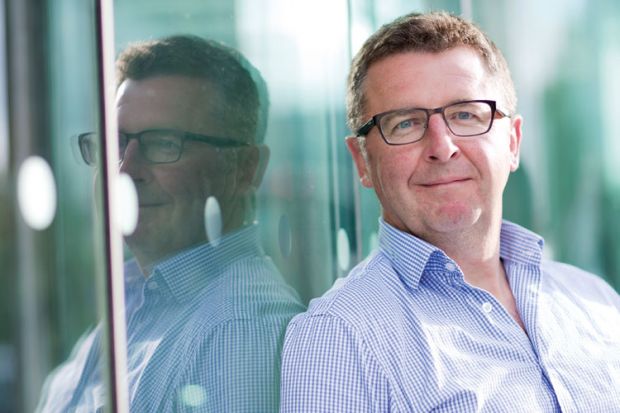Source: Teri Pengilley
David Roblin was head of research at Pfizer’s former site at Sandwich in Kent, and has also been chief medical officer and a non-executive director at a number of biotech companies. In September he joins the Francis Crick Institute as chief operating officer and director of translation.
Where and when were you born?
In 1966 in an industrial valley in South Wales. Beautiful landscapes, passionate people who loved learning and sport and, of course, very heavy industry.
How has this shaped you?
The passion is there, and a will to win. But the valley’s journey from industrialisation taught me a lot. Fairness is a value I aspire to and admire in others.
What impact do you expect the Crick will have on UK and global biomedical research and innovation?
The Crick is an unprecedented opportunity to put the UK at the forefront of global biomedical discovery, and to translate this into new treatments and technologies that will benefit patients and create economic opportunities for the country. We also have a crucial role to play in training some of the best interdisciplinary researchers, and then supporting them to find leadership positions elsewhere, with a strong focus on UK institutions.
How does it feel to take up a position at an academic and research-oriented institution, having previously worked at multinational corporations?
A magnificent challenge. Many similarities and, of course, differences. I am perhaps able to plan for the long term more than I ever was in a pharmaceutical firm.
Although the recent takeover bid by Pfizer for AstraZeneca failed, could it be the impetus for other global pharmaceutical firms to try to take over British companies?
I am a veteran of three mega-mergers in my time in Pfizer, so I certainly have some experience. These mergers are so often driven by commercial short-term aims. The R&D dimension is, of course, important to these companies but only afterwards. Perhaps this is inevitable since the journey to a new medicine takes at least a decade. It takes a long time to recover productivity after a major merger and I can’t help feeling that there is a loss of global innovation every time one occurs.
How important are universities’ links with big pharmaceuticals?
The big pharma presence is key as part of the journey from the curiosity-driven scientific insight of our academics to its application for health and wealth purposes. It takes around a billion pounds to develop a new medicine (counting the costs of failures, too). We need large, well-capitalised companies with the capability and expertise to invest over this horizon.
If you were facing £9,000 fees, would you go to university or straight into work?
Go to university. The wider education it provides opens your mind to a world of experiences and possibilities.
What was your university experience like?
I worked hard, played hard and met the loves of my life; science, medicine and my wife (perhaps not in order of importance).
As a child, what did you want to do when you grew up?
To play cricket for Glamorgan and England (and Wales). Then become an architect.
What advice would you give to your younger self?
As my kids would say, YOLO (you only live once). Try every experience offered (within the law and reason). And when times are tough, KBO (keep buggering on, an acronym Winston Churchill used in his war letters).
What are the best and worst things about your job?
Look, I’m in the honeymoon period at the moment. There’s a lot to do to deliver this once-in-a-lifetime opportunity to change the way science is done and British science is regarded. I’m honoured to be here towards the start of the journey. What’s not to like?
Register to continue
Why register?
- Registration is free and only takes a moment
- Once registered, you can read 3 articles a month
- Sign up for our newsletter
Subscribe
Or subscribe for unlimited access to:
- Unlimited access to news, views, insights & reviews
- Digital editions
- Digital access to THE’s university and college rankings analysis
Already registered or a current subscriber? Login

